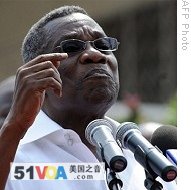Dakar
24 February 2009
Ghana's coming oil boom brings with it questions of financial transparency and environmental protection. The government has just now put in place a regulatory structure to account for what could be $1 billion in annual revenue by the start of next year.
 |
| President-elect John Atta-Mills addresses party supporters shortly after being declared winner of the runoff presidential election in Accra (File) |
The so-called "Jubilee" field has proven reserves of more than 600 million barrels of oil. Along with natural gas, the International Monetary Fund predicts that the field alone could earn Ghana as much as $20 billion by the year 2030.
But making sure the new government spends that new money wisely means significant changes to ensure the transparent development of the oil industry, according to a new report from the aid agency Oxfam America and Ghana's Integrated Social Development Center.
"Oil booms raise a great deal of public expectation about the amount of money that will be spent, about the number of jobs that will be created, and too often governments and oil companies often feed these expectations about how this new 'black gold' will change everything on the ground," said Ian Gary, the senior policy advisor for extractive industries at Oxfam America.
One of the biggest expectations is President John Atta-Mills' promise to improve education in Ghana. But in his first State of the Nation address, the president said overspending by the previous government has left Ghana broke, with rising inflation and a fiscal deficit close to 15 percent of gross domestic product.
President Atta-Mills' National Democratic Congress government hopes to use oil revenue to help meet United Nations development goals in a country where almost 80 percent of the people live on less than two dollars a day.
Gary says past experience with African oil booms shows that the transparent management of oil funds not only improves public spending but gives the public greater confidence that their money is being handled properly.
"One of the challenges for Ghana will be not only to spend that money but to spend it wisely," he said. "And in many countries, you see high levels of spending but very poor quality of spending. You see the establishment of patronage systems where oil money is given to political elites or people with politically-connected businesses rather than being directed and targeted to real poverty-reduction efforts."
Abdulai Dramani, the environmental program officer for the Accra-based research and advocacy group Third World Network-Africa, says Ghanaians are over emphasizing the potential contribution of the oil sector without properly preparing for its affect on people who make a living near the offshore field.
"There are a number of fundamental issues there so for example we still have the problem of the fisher folks in the area where the oil exploitation is taking place. Second the whole idea of transparency," said Dramani.
Dramani says Ghanaians do not know how much the government has collected in contract signing bonuses or how that money will be used. He says there must be proper mechanisms in place to minimize corruption and mismanagement in the young oil sector.
"We haven't gotten there yet. We've just come out with the draft bill for the petroleum authority. The second aspect has to do with the actual practice, which relates to human behavior and the abuse of political power and all that," continued Dramani. "It might not necessarily be an issue of corruption but it will be an issue where the system simply legalizes the flight of capital from the Ghanaian economy."
Since the discovery in the "Jubilee" field, more than 40 companies have applied for licenses to explore for oil. Oxfam America's Ian Gary says the Atta-Mills government can best control the pace of oil industry development by placing a moratorium on new licenses until Ghana's legal framework catches up.
"They need to be able to put in place the right regulations and institutions before a great increase in the oil industry rather than after," said Gary. "Too many places we've seen oil undermining democracy and democratic institutions rather than supporting it."
Oil booms do not guarantee balanced development. While Africa last year produced more than 12 percent of the world's oil, Gary says those revenues have yet to translate into tangible benefits for Africa's poor with resource-rich countries generally showing lower growth rates than African nations with fewer resources.